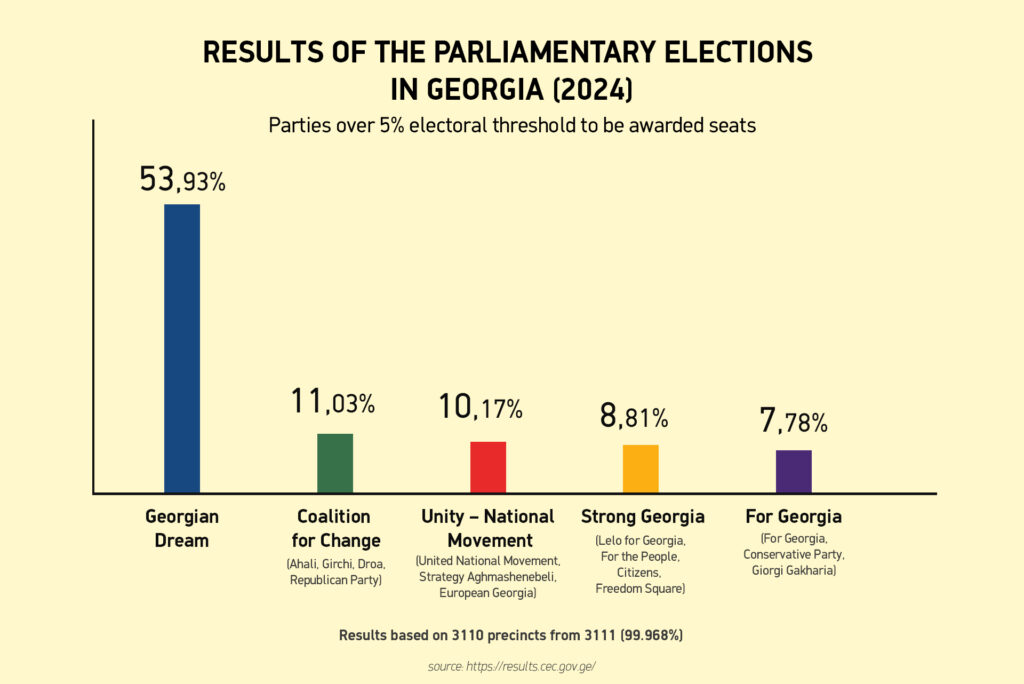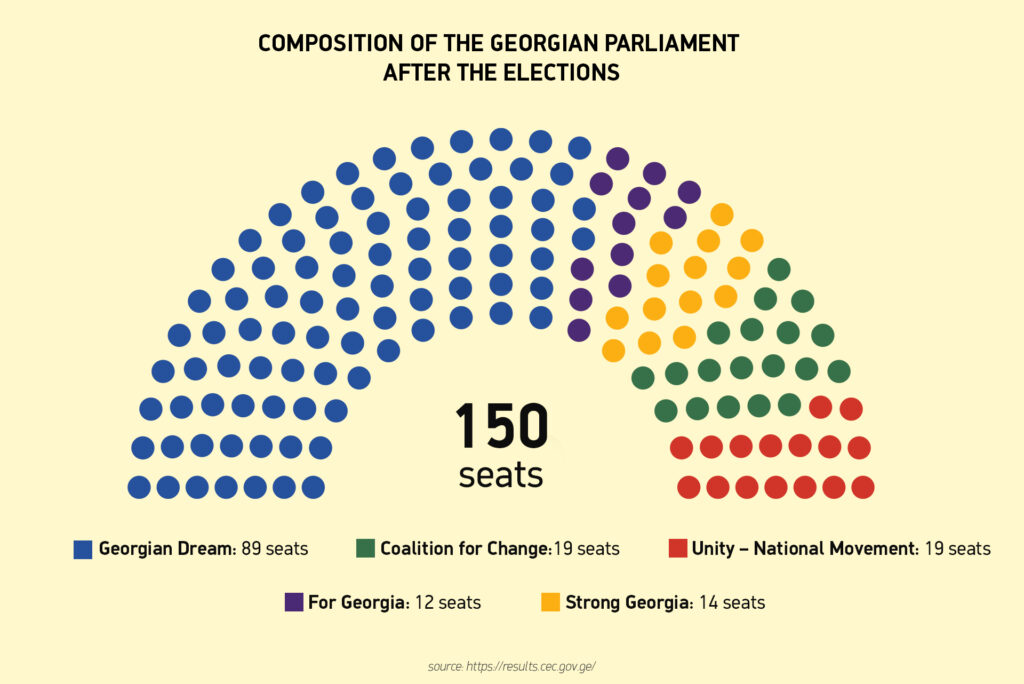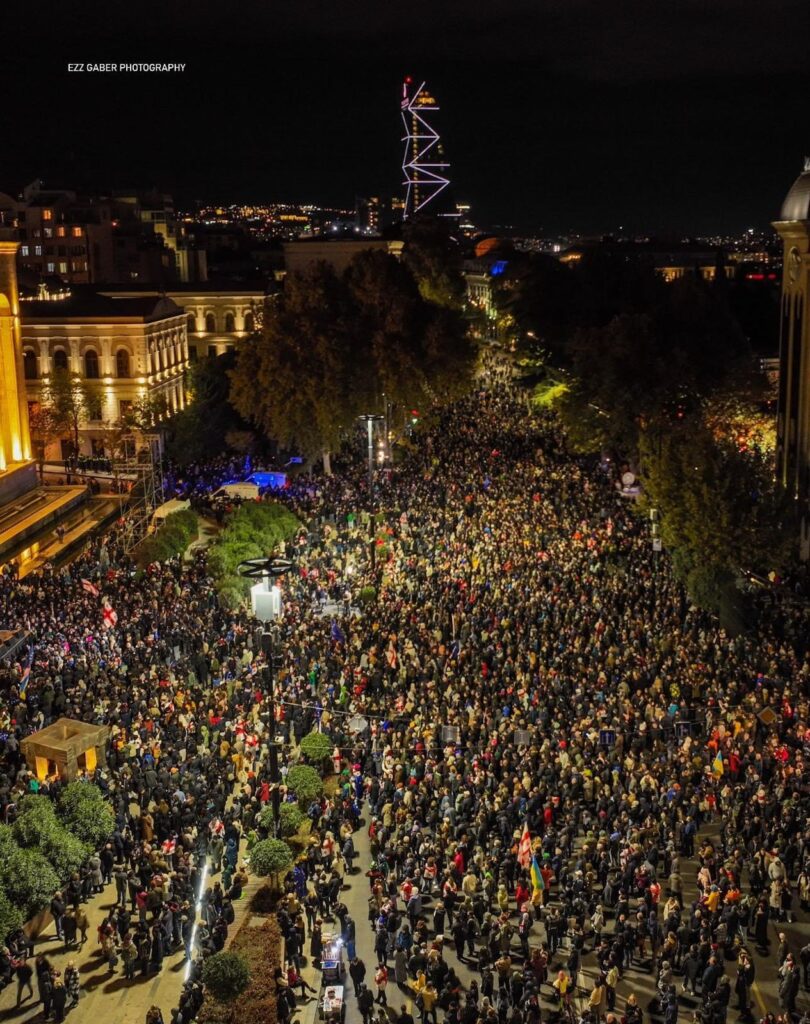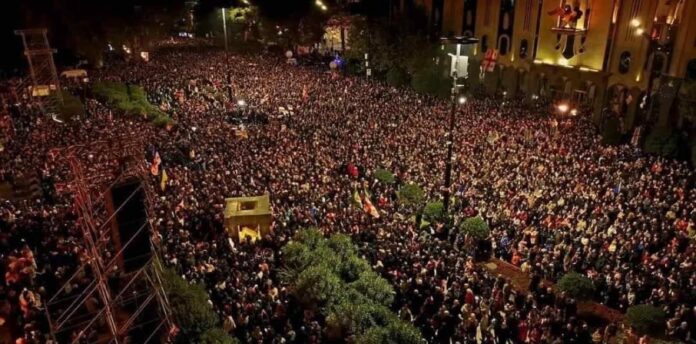Dimitris Mitrakas
On October 26, elections took place in Georgia, with the ruling Georgian Dream party securing 54% of the vote. The announcement of the results led to widespread controversy, as President Salome Zourabichvili and major opposition parties rejected the elections as invalid, pointing to numerous indications of alleged vote tampering. International observers, including the European Union, the United States, and several organizations, also expressed concerns about the integrity of the election process.
Background
In recent months, public dissatisfaction with Georgian Dream has grown significantly, spurred by controversial legislative moves, including the Foreign Agents Law and proposed changes affecting LGBT rights. These measures sparked widespread and prolonged protests, with demonstrators demanding that the government refrain from passing laws that would distance Georgia from the European Union membership bid. Many protestors also called for the removal of Georgian Dream, accusing it of holding pro-Russian sympathies. Although the protests eventually subsided, many people saw the upcoming elections as a critical opportunity for change.
Election Results
With 99.97% of the votes counted, Georgian Dream held 54% of the vote, while opposition parties that managed to secure parliamentary seats collectively held 38% (parties needed to surpass a 5% threshold to enter parliament). Despite the apparent increase in Georgian Dream’s share of the vote—from 48% in the 2020 elections to 54%—the party lost one parliamentary seat due to a recent shift from a majoritarian to a proportional electoral system. This left them with 89 seats, down from 90.
This result was surprising, given the public dissatisfaction with the ruling party. Interestingly, exit polls conducted by the government-aligned Imedi TV, in association with Gorbi polling, suggested a 56% victory for Georgian Dream. However, other exit polls from Edison Research and HarrisX indicated lower support, with figures at 41% and 42%, respectively.


Allegations of Election Rigging
Allegations of electoral fraud surfaced soon after the polls closed, with subsequent investigations and video evidence adding weight to these claims. Specific reports cited at the end of this article provide further details on irregularities.
In response to public outcry, the country’s electoral commission conducted a recount of 14% of the votes. Their conclusion was that the results were ‘only slightly’ different. Firstly, it must be said that ‘only slightly’ is not acceptable when we are talking about elections. Secondly, the intimidation that took place outside the polling stations, the bribery, the people voting with stolen IDs and many other things cannot be revealed by a recount but are attempts to falsify the result.
For example, in recent months, reports emerged of civil servants being pressured to participate in pro-government counter-protests under threat of job loss. In addition, before the elections, Georgian Dream used its majority in parliament to amend the electoral law, changing the electoral commission’s decision-making threshold from a two-thirds majority to a simple majority—allowing the ruling party to control electoral decisions.
Pre-Election Period
The Georgian Dream campaign framed the elections as a referendum on “war or peace,” warning voters that a victory for the opposition could lead Georgia down a path similar to Ukraine’s. Georgian Dream aimed not only to win but to secure an absolute majority—113 out of 150 seats—sufficient to amend the constitution. While the party hinted at potential constitutional changes, including anti-LGBTQ legislation and other measures affecting national security and self-determination, it did not specify these proposals in detail.
Another objective of Georgian Dream was to outlaw the United National Movement (UNM), the main opposition party, along with other parties linked to it, by declaring them illegal and unconstitutional.
Opposition parties, for their part, formed multiple electoral alliances, the most notable being Unity – National Movement, Coalition for Change, For Georgia, and Strong Georgia, all of which succeeded in securing parliamentary seats. In the 2020 elections, 50 parties competed, creating significant fragmentation that many argue benefitted the ruling party. For this election, opposition alliances and withdrawals reduced the field to 18 parties, though most were either liberal or right-leaning, with few offering a clear or robust political platform.
The opposition, meanwhile, presented the elections as a referendum on Georgia’s EU integration. Although President Salome Zourabichvili was not a candidate, she became an influential opposition figure. Over recent months, she sought to counter Georgian Dream’s policies, frequently using her veto power and calling for public protests. One of her key initiatives was a declaration announced in May, which invited opposition parties to commit to forming a technocratic government after the elections, regardless of the outcome. This proposed government would prioritize EU membership efforts and schedule new democratic elections for 2025. Nearly all opposition parties signed this declaration.
After the Elections
On Monday, October 28, following the announcement of the election results, there was a large protest in the capital, Tbilisi, denouncing alleged election fraud.
In the days that followed, all opposition parties declared that they would not recognize the results and would boycott parliament. Three opposition parties called for another large protest on November 5, and the rally attracted significant support.
A week later, on November 11, additional protests were held, as opposition parties reiterated their refusal to participate in parliament under the disputed results.

International Repercussions
The day after the elections, a group of Members of the European Parliament (MEPs) issued a statement urging the European Union not to recognize the results. The European Commission acknowledged allegations of fraud but stopped short of calling the election results illegitimate. Sweden’s Minister for Development Cooperation and Foreign Trade, Benjamin Dousa, took a stronger stance, announcing plans to suspend cooperation with Georgia. Sweden is one of the largest providers of humanitarian aid to Georgia, contributing nearly $19 million annually.
U.S. President Joe Biden called on the Georgian government to investigate the fraud allegations, affirming his support for Georgia’s independence and territorial integrity. Canada’s diplomatic service also announced a review of its relations with Georgia, and the French government echoed calls for an investigation into potential fraud.
In contrast, the leaders or representatives of Turkey, Azerbaijan, Armenia, China, and Hungary congratulated Georgian Dream on its victory, describing the process as orderly. Hungary’s Prime Minister Viktor Orbán notably offered his congratulations before the results were officially confirmed and visited Georgia two days after the election.
Russia also weighed in on the Georgian elections. Grigory Karasin, a spokesman for the Russian parliament, remarked that the elections had occurred in a “calm atmosphere” and expressed optimism that the results would positively impact Georgia and the wider Caucasus region. Additionally, Deputy Chairman of the Russian Security Council (and former president of Russia), Dmitry Medvedev, called for the arrest of President Salome Zourabichvili, accusing her of encouraging a coup.
A Country Between A Rock and A Hard Place
The Georgian people find themselves caught between two powerful forces: Russia and the West. Much of what transpires in Georgia is viewed through the lens of this ongoing geopolitical rivalry, and the recent elections were no exception. Each country’s stance on the election outcome appears to align with its geopolitical interests rather than any assessment of potential fraud. Western nations, led by the EU and the United States, rejected the results, while nations closer to Russia, including Russia itself, accepted them.
Western countries continue to attempt to influence Georgia’s direction through various funding mechanisms, NGOs, and media channels. At the same time, Georgian Dream’s founder, Bidzina Ivanishvili, has been resisting full Western control, which has led to efforts to remove him. The German embassy went as far as calling for a “revolution” in Georgia. Russia, meanwhile, opposes Western influence in Georgia, supporting Georgian Dream as a means of keeping NATO and other Western alliances out of the region.
The Georgian people are the ones most affected by these tensions. For example, Sweden’s decision to cut funding does not directly impact Georgian Dream but affects the broader population. Russia, meanwhile, occasionally issues veiled threats of war to discourage Georgia from joining NATO, leaving the population in a constant state of fear. Georgian Dream leveraged these fears in its campaign, framing itself as the party of stability. Despite this, over 80% of Georgians favor EU membership, seeing it as the path toward a more stable future, yet remain on the EU’s waiting list. This delay is actually a geopolitical strategy to keep pressure on Russia.
The election rhetoric created a false binary of “inside or outside the EU.” It’s important to note that Georgian Dream does not outright reject an EU-oriented future; for example, Prime Minister Irakli Kobakhidze recently stated that “Europe has always been the natural choice for Georgia.” However, neither Georgian Dream nor the opposition has provided real answers to the issues facing the people—persistent poverty, unemployment, and a lack of basic freedoms, especially for marginalized communities such as LGBTQ+ individuals. Even the right to vote is often limited by systemic barriers.
Real progress in Georgia will require a more radical push for change. This includes building mass movements that genuinely represent and fight for the interests of working people, the impoverished, and marginalized groups. Recently, the Georgian people have shown remarkable resilience and mobilization in protests and civic actions, demonstrating a growing public consciousness in their call for change.
Annex – Data on Electoral Fraud
The Preliminary Findings and Conclusions of the International Election Observation Mission reported widespread irregularities during the Georgian elections, including cases of voter intimidation and violence. It highlighted that, in many polling centers, voter secrecy was not upheld and that election commission members often acted as partisan representatives. Unauthorized individuals were also observed interfering in the process by checking voter identities or registering voters. The investigation further noted that Georgian Dream used cameras to monitor the voting process—while technically legal, these cameras were often aimed at ballot boxes or ID verification points, which may have been intended to intimidate voters.
My Vote, an initiative by Georgian NGOs, corroborated many of these complaints and identified additional issues, such as the confiscation of ID cards by officials, reportedly allowing others to vote using these IDs.
ISFED (International Society for Fair Elections and Democracy), an NGO operating in Georgia, also released findings on the election, reporting incidents of intimidation and coercion near polling stations and cases of individuals casting multiple votes.
The Georgian Young Lawyers’ Association (GYLA) raised concerns about the electronic voting process, stating that it was often apparent which candidate the voter supported. This issue was flagged during testing, and although assurances were made that it would be resolved, no changes were implemented by election day. The Tetritskaro District Court upheld GYLA’s complaint, annulling the results from 30 polling stations due to these irregularities.
Following the election, numerous videos surfaced under the hashtag #მევნახეგაყალბება (#BreakaFraud), substantiating these allegations. Videos included footage of individuals distributing money to registered voters (video 1, video 2, video 3), incidents of violence and intimidation near polling stations, and cases of individuals inserting multiple ballots into the ballot box. The latter was even acknowledged by local authorities.
Exit poll data from organizations like Edison Research, HarrisX, and Europe Elects also raised questions about the election’s credibility. Surveys suggested that the results were statistically improbable. For instance, Georgian Dream achieved 100% support in some precincts, which is inconsistent with its overall 54% vote share.
Additionally, videos circulating online purportedly show discrepancies in voter counts, with some areas reporting more votes than the total registered population.
It is worth noting, however, that many NGOs and Western observer organizations often apply different standards depending on the geopolitical context, with less scrutiny applied to instances of fraud in Western-aligned nations. Despite extensive reports of irregularities, most observer organizations have not formally questioned Georgian Dream’s overall electoral victory.













